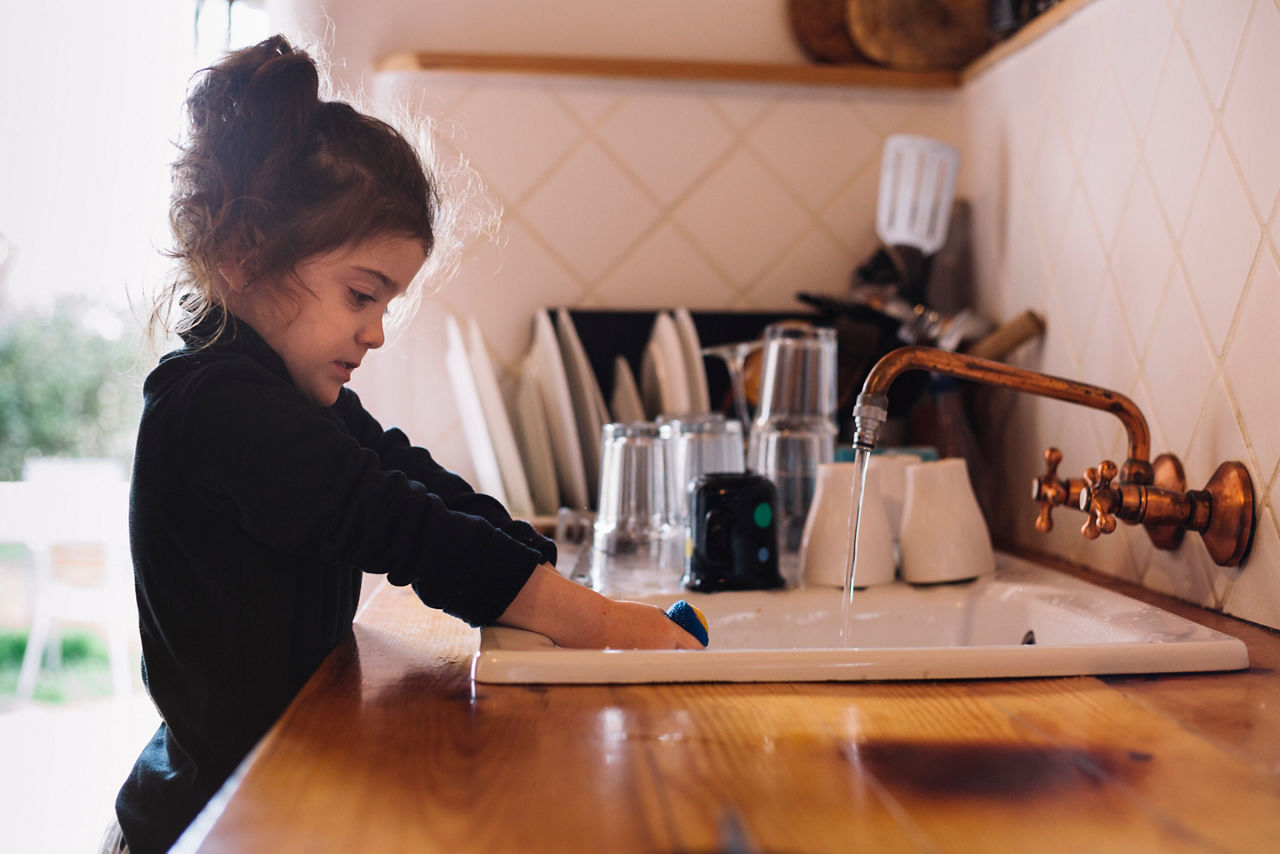Danone Specialized Nutrition (Malaysia) Sdn Bhd supports exclusive breastfeeding for your infant’s first six months of life. After six months of age, infants should receive age-appropriate complementary foods while breastfeeding continues for up to two years of age or beyond. Consult your doctor before deciding to use infant formula or if you have difficulty breastfeeding.
10 Life Skills to Raise An Independent Child
Today’s parents are increasingly concerned about their children’s mental and physical development. They focus on academic performance or enroll their children in after-school sports activities. But oftentimes, parents neglect more important lessons. In their busy-ness, they may miss the opportunity to equip their kids with important life skills. And it is these crucial skills that are the key to raising an independent child.
In our effort to give our children the best life possible, we tend to forget about teaching them practical life skills, like doing the laundry, cooking, or washing the dishes.
A recent study by online security company AVG Technologies revealed that although 58% of three to five year olds in the USA know their way around a smartphone, less than 15% of these kids can make their own breakfast. That’s one out of six kids.
“I see many parents doing everything for their kids instead of letting them figure out how to fend for themselves,” says Tim Elmore, founder of Growing Leaders, a nonprofit in Norcross, Georgia, that works with schools and civic groups to promote leadership qualities in children.
As early as you can, you can teach your kids the joy of independence. Try not to force them to do things. Instead, focus on how they don’t have to wait for you to get things done. Raising independent kids is all about teaching your little ones how to do things on their own.
Raising Independent Kids: Important Life Skills for Children
1. Doing The Laundry
Too many teenagers go into their adulthood without learning how to wash their clothes. Don’t let your kids become one of them. You can teach your kids to wash their clothes as early as six years old – with adult supervision, of course.
If you have a top-loading washing machine at home, make sure you have a stool ready for your little kid. Teach him how you do the laundry by walking him through the process step by step, from measuring and adding the detergent, to choosing the settings, then starting the machine.
2. Planting a Seedling
This is a life skill for children that will help teach them the important role that plants play and how to make their own food. As an added bonus, it works wonders in teaching your young one to be an independent, self-reliant child.
Many kids today are taught how to plant seeds in class. But usually, this isn’t followed up by a lesson on how to transfer sprouts to a garden. It may take time and some digging under the sun, but when children see the fruits of their hard work, by harvesting a crop of potatoes or by making a flower bloom, they will be filled with a sense of achievement. And this is an important step in a child’s journey to become resilient.
3. Gift-wrapping
Gifts are a great way for a child to show gratitude, and it gives him a new way to show his love for important people in his life. So why not help him? Giving gifts – and giftwrapping those gifts – teaches a child that he can do something on his own to make another person feel better. Plus, thinking of others helps to prevent your little one from turning into a spoiled brat.
4. Home Repairs
Teaching home repairs begins with simple things like learning how to hammer a nail. You can start your kid (preferably eight-years-old) on a seven- to nine-ounce hammer that they can practice with. Some home-improvement shops sell tools for kids.
They can practice with soft wood (like pine, poplar, or cedar). To get started, hold the wood in place with a clamp or a vise, or just place it on the ground.
Start your kids on nails with wide heads so they’re easier to hit, and always do it first so they can follow your example. Go for a few tries, just with light taps, and keep practicing until he or she gets the hang of it.
5. Writing a Letter
An important part of independence is communication. Verbal skills are great, but every adult needs to know how to write a letter. You can teach your kids how to properly write and format a letter, how to attach stamps, and drop it in the mailbox. They can even enhance letters with their drawings!
Start with how your kids can start letters (“Dear…” or “Greetings!”) before writing the body, then a closing remark (Sincerely, Truthfully yours, etc), then their signature. Next time you’re writing holiday cards, have them help, too!
6. Cooking a Meal
No life skill is more important to life than cooking. If raising independent kids is important to you, this life skill is a must. To start, ask your child to help you prepare meals. Young children can help you set the table. Then you can move them up, by having them help you to prepare the ingredients, like peeling potatoes and washing fresh vegetables.
When your child is around eight-years-old and above, you can train him in using a knife. Just make sure he uses a small knife that fits his hands. Guide him every step of the way so he can avoid any accidents.
Don’t worry if all this instruction is just making prep time longer. This is a good bonding time for you and your child. When he gets used to the work, he can help more in the future and you can cut prep time in half!
7. Navigating
Since kids know their way around phones anyway, having them navigate for you teaches them how to better communicate data. It’s a great way to sharpen their spatial abilities and their communication skills.
8. First Aid
This is one of the most important life skills for children you can teach.
Teach them what to do when an accident happens by running them through various scenarios. Instruct them on what to do in case someone is choking, or having a seizure. Tell them what to do in case of cuts or a hard knock. The more they practice, the more their reaction to accidents will become automatic.
9. Cleaning the Bedroom
A resilient, self-reliant child cleans up after himself. At the end of the day, or after playtime, teach your child to pack away his toys and put them back in their proper places or storage bins. Once he has the hang of packing away, tell him to do it every day, on his own. This will form good habits and help him to become self-reliant.
10. Smart Shopping
You don’t want your kids to rely on fast food when they’re grown up. So teaching them how to be smart consumers is important. This is one of those life skills for children that you have to teach because it involves their ability to make decisions and handle money. With this skill, you’re well on your way to raising independent kids.
Teaching Life Skills Is an Important Part of Raising Independent Kids
Teaching life skills for children is no easy feat. But it’s important that you teach them these skills so they can take care of themselves in the future. The rewards of these lessons will prove to be invaluable: your independent child will grow up to become an independent adult, ready to take on the world.
Article sourced from theAsianparent Malaysia:
Life skills for children: Teach your kids these important life skills

Connect with our team of experts
We provide advice and support for you on your parenthood journey.

